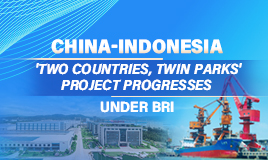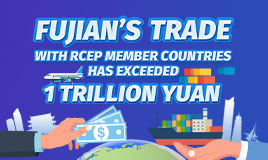Nations unite in win-win trade partnership
Future economic and trade ties between China and Indonesia will be strengthened by the tangible growth of the Belt and Road Initiative, the Regional Comprehensive Economic Partnership and their complementary goods trade structure, said experts and business leaders.
With the two countries making substantial progress in big-ticket projects — including the Jakarta-Bandung high-speed railway and a number of manufacturing and energy projects — they said that their business relations will create vitality and stability to ensure supply chain operations across the Asia-Pacific region and the world in the coming years.
Bilateral relations have enhanced in recent years, especially after both agreed to form a comprehensive strategic partnership in 2013 and succeeded in synergizing Indonesia's Global Maritime Fulcrum strategy and the BRI in 2018, said Zhang Jianping, head of the center for regional economic cooperation at the Chinese Academy of International Trade and Economic Cooperation.
The GMF is aimed at making more effective use of Indonesia's vast sea to boost its national economy by improving connectivity through port infrastructure, sea transport and assuring sustainable production of maritime-related resources.
Both China and Indonesia have closely communicated and coordinated on deepening international anti-pandemic cooperation and promoted global governance reform under global and regional frameworks and multilateral mechanisms, such as the United Nations, G20 and the World Health Organization, Zhang noted.
Benefiting from closer business ties and the RCEP, China-Indonesia trade soared by 28.8 percent year-on-year to $110.1 billion between January and September, data from China's General Administration of Customs show.
The RCEP, the world's largest free trade deal to date, covers 10 member states of the Association of Southeast Asian Nations and its five free-trade agreement partners, namely China, Japan, the Republic of Korea, Australia and New Zealand.
The pact's signatory countries account for roughly 30 percent of the world's gross domestic product and population. More than 90 percent of trade in goods among approved member economies will gradually be tariff-free, according to information from China's Ministry of Commerce.
The implementation of the pact has not only brought tax cuts to Indonesian exporters, but will encourage Chinese manufacturers to ship more goods to Indonesia in the years ahead, said Sang Baichuan, dean of the Institute of International Economy at the University of International Business and Economics in Beijing.
In addition to agricultural and mining products, Indonesia's exports to China include fossil fuels, paper pulp, chemicals, and animal and plant oils. China ships mainly computers, telecommunication equipment, medical equipment, plastic and rubber products, textiles and household appliances to Indonesia. Its passenger vehicles and trucks have also become popular in the country in recent years.
With both countries pursuing green, high-quality and innovation-led growth, the two-way investment cooperation has expanded from sectors such as agriculture, fisheries, energy, finance, infrastructure and manufacturing to fast-growing areas. These include trade in services, 5G, artificial intelligence, big data and cloud computing, with scientific and technological innovation as a driving force, he added.
Zhai Jingli, deputy CEO for China at Asia Pulp and Paper, a five-time participant of the China International Import Expo and a subsidiary of Indonesia's Sinar Mas Group, said: "Benefiting from the RCEP agreement, APP will be able to export more pulp and raw materials to China and then export a part of the finished products made in China to other RCEP markets, to meet diversified demand both internally and internationally, as well as help support the growth of regional economic integration," she said.
Chinese companies such as China Energy Engineering Group, China Railway Group and Huawei Technologies have notably contributed to the Southeast Asian country's economic and social development, according to a report released by the Jakarta-based China Chamber of Commerce in late October.
The report on Chinese companies' social responsibility in Indonesia, the first such report based on research from June 2020 to June 2022, said that Chinese companies have participated in Indonesia's economic development and industrial upgrades.
In the nickel industry, digital economy, infrastructure and new energy, Chinese companies have contributed to Indonesia's economic development by introducing advanced technologies, provided financial support and cultivated local talents, the report said.
In addition, Chinese companies have engaged in public welfare activities and contributed to the fight against the pandemic, to community development, disaster relief, poverty alleviation, education, healthcare, culture and sports in Indonesia, said the study.
Chinese Ambassador to Indonesia Lu Kang said the report demonstrates to Indonesians that Chinese companies have been fulfilling their social responsibilities, and he expressed his hope that people would learn more about stories of Chinese companies in Indonesia.
With its abundant resources and potential, Indonesia is perfectly matched with China's cutting-edge technologies and financing. With this understanding, Indonesia is open to China's investment to tackle global issues such as public health and digital and energy transition, said Zhao Ping, deputy head of the Academy of China Council for the Promotion of International Trade.
Collaboration with China is essential to boost Indonesia's efforts in strengthening its downstream industries, leading to value-added export commodities and making Indonesia the center of the global value chain in many products, such as lithium batteries and medical items, she added.
As both countries have agreed to accelerate other landmark projects such as the Regional Comprehensive Economic Corridor and "Two Countries, Twin Parks" — which allows the countries to develop interconnected business sectors in industrial estates — Fuqing, a county-level city in Fuzhou, Fujian province, is planning to build a pilot area for trade and investment cooperation between China and Indonesia, according to information released by the city's government in September.
The project, set to cover 12 square kilometers in Fuqing, will have six areas: government service; cultural communication; business; education; manufacturing; and industry-city integration. This mainly consists of residential communities, service facilities, hospitals and schools, said the local government.
Besides building a library, an international conference and exhibition center and a cultural exchange center, there is to be a street with Indonesian characteristics, a cooperative bank and a financial settlement center built in the pilot area.




